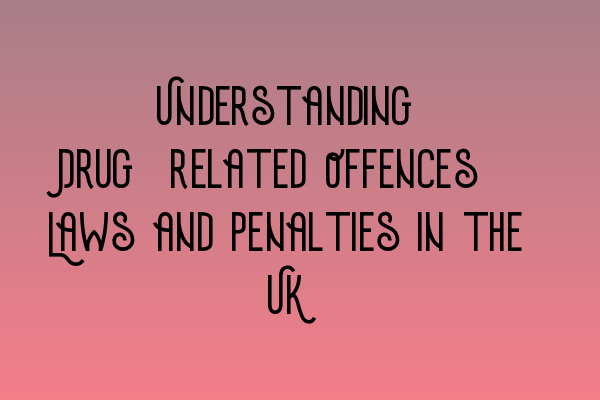Understanding Drug-related Offences: Laws and Penalties in the UK
Drug-related offences are serious crimes that can have severe consequences in the United Kingdom. Whether you are involved in drug possession, trafficking, or cultivation, it is essential to understand the laws and penalties surrounding these offences.
Laws and Legislations
In the UK, drug-related offences are primarily governed by the Misuse of Drugs Act 1971. This act classifies drugs into different categories known as “controlled substances” and sets out the penalties for their possession, supply, production, and importation. The act defines three main categories of drugs:
- Class A: This category includes drugs such as heroin, cocaine, ecstasy, and LSD. Possession, supply, and production of Class A drugs carry the most severe penalties.
- Class B: Drugs like cannabis, amphetamines, and ketamine fall under this category. Penalties for possession and supply of Class B drugs are less severe compared to Class A drugs.
- Class C: Substances like anabolic steroids and tranquilizers are classified as Class C drugs. Possession and supply of Class C drugs carry lesser penalties compared to Classes A and B.
It is important to note that the classification of drugs can change over time based on their potential harm and misuse.
Penalties for Drug-related Offences
The penalties for drug-related offences vary depending on several factors, including the type and quantity of drugs involved, the defendant’s role in the offense, and any previous convictions. Here is a general overview of the penalties:
- Possession: The possession of controlled substances, irrespective of their category, is a criminal offense. The penalties for possession can range from a fine to imprisonment, depending on the quantity and circumstances.
- Supply and Production: Engaging in the supply or production of drugs, especially Class A substances, can lead to lengthy prison sentences and substantial fines.
- Intent to Supply: If an individual is found with a certain quantity of drugs that suggests an intention to supply, they may face more severe penalties than simple possession.
- Aggravating Factors: Certain aggravating factors, such as involvement of minors, use of violence, or connection to organized crime, can significantly increase the penalties for drug-related offences.
Defenses and Mitigation
If you find yourself facing drug-related charges, it is crucial to seek legal advice immediately. An experienced criminal defense solicitor can help you understand your legal options and build a strong defense. Some common defenses against drug-related offences include:
- Unlawful Search and Seizure: If the drugs were obtained through an unlawful search or seizure by the police, it may be possible to have the evidence excluded from the case.
- Lack of Possession: If you were unaware of the presence of drugs or did not have control over them, it may be a valid defense against possession charges.
- Mistaken Identity: If you can prove mistaken identity, showing that you were not the person involved in the drug-related offense, it can be a strong defense.
Furthermore, if convicted, a solicitor can help mitigate the penalties by presenting mitigating factors such as demonstrating remorse, cooperation with authorities, or seeking rehabilitation.
Conclusion
Drug-related offences in the UK carry severe penalties, making it essential to understand the laws and consequences associated with these crimes. Whether you find yourself facing drug possession, supply, or production charges, seeking professional legal advice is crucial to safeguard your rights and mount a robust defense. Remember, every case is unique, so consult a qualified solicitor who can guide you through the legal process.
